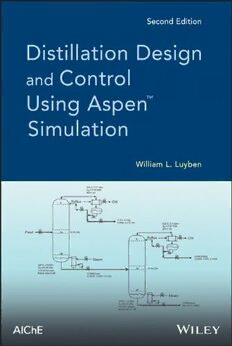Table Of ContentDISTILLATION DESIGN
AND CONTROL USING
TM
ASPEN SIMULATION
DISTILLATION DESIGN
AND CONTROL USING
TM
ASPEN SIMULATION
Second Edition
WILLIAM L. LUYBEN
Lehigh University
Bethlehem, Pennsylvania
Cover design: John Wiley & Sons, Inc.
Cover image: # William L. Luyben
Copyright # 2013 by John Wiley & Sons, Inc. All rights reserved.
Published by John Wiley & Sons, Inc., Hoboken, New Jersey.
Published simultaneously in Canada.
No part of this publication may be reproduced, stored in a retrieval system, or transmitted in any form or by any
means, electronic, mechanical, photocopying, recording, scanning, or otherwise, except as permitted under
Section 107 or 108 of the 1976 United States Copyright Act, without either the prior written permission of the
Publisher, or authorization through payment of the appropriate per-copy fee to the Copyright Clearance Center,
Inc., 222 Rosewood Drive, Danvers, MA 01923, (978) 750–8400, fax (978) 750–4470, or on the web at
www.copyright.com. Requests to the Publisher for permission should be addressed to the Permissions
Department, John Wiley & Sons, Inc., 111 River Street, Hoboken, NJ 07030, (201) 748–6011,
fax (201) 748–6008, or online at http://www.wiley.com/go/permission.
Limit of Liability/Disclaimer of Warranty: While the publisher and author have used their best efforts in
preparing this book, they make no representations or warranties with respect to the accuracy or completeness of
the contents of this book and specifically disclaim any implied warranties of merchantability or fitness for a
particular purpose. No warranty may be created or extended by sales representatives or written sales materials.
The advice and strategies contained herein may not be suitable for your situation. You should consult with a
professional where appropriate. Neither the publisher nor author shall be liable for any loss of profit or any other
commercial damages, including but not limited to special, incidental, consequential, or other damages.
For general information on our other products and services or for technical support, please contact our Customer
Care Department within the United States at (800) 762–2974, outside the United States at (317) 572–3993 or
fax (317) 572–4002.
Wiley also publishes its books in a variety of electronic formats. Some content that appears in print may not
beavailableinelectronicformats.FormoreinformationaboutWileyproducts,visitourwebsiteat
www.wiley.com.
LibraryofCongressCataloging-in-PublicationData
Luyben,WilliamL.
DistillationdesignandcontrolusingAspensimulation/WilliamLLuyben.–2nded.
p.cm.
“AIChE.”
Includesindex.
ISBN978-1-118-41143-8(cloth)
1. Distillationapparatus–Designandconstruction. 2. Chemicalprocesscontrol–Simulationmethods.
3. Petroleum–Refining. I. AmericanInstituteofChemicalEngineers. II. Title.
TP159.D5L892013
0
660.28425–dc23
2012030047
PrintedintheUnitedStatesofAmerica
10 9 8 7 6 5 4 3 2 1
Thisbookisdedicatedtofarmersallovertheworld.
NoFarmers,NoFood!
CONTENTS
PREFACETOTHESECONDEDITION xv
PREFACETOTHEFIRSTEDITION xvii
1 FUNDAMENTALSOFVAPOR–LIQUID–EQUILIBRIUM(VLE) 1
1.1 VaporPressure / 1
1.2 BinaryVLEPhaseDiagrams / 3
1.3 PhysicalPropertyMethods / 7
1.4 RelativeVolatility / 7
1.5 BubblePointCalculations / 8
1.6 TernaryDiagrams / 9
1.7 VLENonideality / 11
1.8 ResidueCurvesforTernarySystems / 15
1.9 DistillationBoundaries / 22
1.10 Conclusions / 25
Reference / 27
2 ANALYSISOFDISTILLATIONCOLUMNS 29
2.1 DesignDegreesofFreedom / 29
2.2 BinaryMcCabe–ThieleMethod / 30
2.2.1 Operating Lines / 32
2.2.2 q-Line / 33
2.2.3 Stepping Off Trays / 35
2.2.4 Effect of Parameters / 35
2.2.5 Limiting Conditions / 36
vii
viii
CONTENTS
2.3 ApproximateMulticomponentMethods / 36
2.3.1 Fenske Equation for Minimum Number of Trays / 37
2.3.2 Underwood Equations for Minimum Reflux Ratio / 37
2.4 Conclusions / 38
3 SETTINGUPASTEADY-STATESIMULATION 39
3.1 ConfiguringaNewSimulation / 39
3.2 SpecifyingChemicalComponentsandPhysicalProperties / 46
3.3 SpecifyingStreamProperties / 51
3.4 SpecifyingParametersofEquipment / 52
3.4.1 Column C1 / 52
3.4.2 Valves and Pumps / 55
3.5 RunningtheSimulation / 57
3.6 UsingDesignSpec/VaryFunction / 58
3.7 FindingtheOptimumFeedTrayandMinimumConditions / 70
3.7.1 Optimum Feed Tray / 70
3.7.2 Minimum Reflux Ratio / 71
3.7.3 Minimum Number of Trays / 71
3.8 ColumnSizing / 72
3.8.1 Length / 72
3.8.2 Diameter / 72
3.9 ConceptualDesign / 74
3.10 Conclusions / 80
4 DISTILLATIONECONOMICOPTIMIZATION 81
4.1 HeuristicOptimization / 81
4.1.1 Set Total Trays to Twice Minimum Number of Trays / 81
4.1.2 Set Reflux Ratio to 1.2 Times Minimum Reflux
Ratio / 83
4.2 EconomicBasis / 83
4.3 Results / 85
4.4 OperatingOptimization / 87
4.5 OptimumPressureforVacuumColumns / 92
4.6 Conclusions / 94
5 MORECOMPLEXDISTILLATIONSYSTEMS 95
5.1 ExtractiveDistillation / 95
5.1.1 Design / 99
5.1.2 Simulation Issues / 101
5.2 EthanolDehydration / 105
5.2.1 VLLE Behavior / 106
ix
CONTENTS
5.2.2 Process Flowsheet Simulation / 109
5.2.3 Converging the Flowsheet / 112
5.3 Pressure-SwingAzeotropicDistillation / 115
5.4 Heat-IntegratedColumns / 121
5.4.1 Flowsheet / 121
5.4.2 Converging for Neat Operation / 122
5.5 Conclusions / 126
6 STEADY-STATECALCULATIONSFORCONTROL
STRUCTURESELECTION 127
6.1 ControlStructureAlternatives / 127
6.1.1 Dual-Composition Control / 127
6.1.2 Single-End Control / 128
6.2 FeedCompositionSensitivityAnalysis(ZSA) / 128
6.3 TemperatureControlTraySelection / 129
6.3.1 Summary of Methods / 130
6.3.2 Binary Propane/Isobutane System / 131
6.3.3 Ternary BTX System / 135
6.3.4 Ternary Azeotropic System / 139
6.4 Conclusions / 144
Reference / 144
7 CONVERTINGFROMSTEADY-STATETODYNAMIC
SIMULATION 145
7.1 EquipmentSizing / 146
7.2 ExportingtoAspenDynamics / 148
7.3 OpeningtheDynamicSimulationinAspenDynamics / 150
7.4 InstallingBasicControllers / 152
7.4.1 Reflux / 156
7.4.2 Issues / 157
7.5 InstallingTemperatureandCompositionControllers / 161
7.5.1 Tray Temperature Control / 162
7.5.2 Composition Control / 170
7.5.3 Composition/Temperature Cascade Control / 170
7.6 PerformanceEvaluation / 172
7.6.1 Installing a Plot / 172
7.6.2 Importing Dynamic Results into Matlab / 174
7.6.3 Reboiler Heat Input to Feed Ratio / 176
7.6.4 Comparison of Temperature Control with Cascade
CC/TC / 181
7.7 Conclusions / 184

